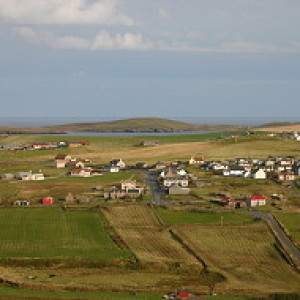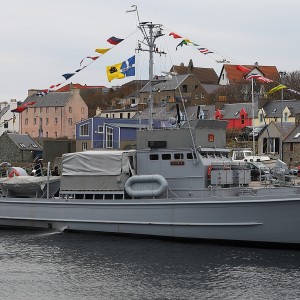The Shetland Bus
Many visitors to Scalloway today to mark the 75th anniversary of an important turning point in the "Shetland Bus" operations. The Statsraad Lehmkuhl which is a regular visitor to Lerwick came over from Bergen for the occasion accompanied by the Norwegian navy vessel Hitra. (see extra)
The following is from the Shetland Times
A weekend of Shetland Bus commemorations got under way in Scalloway this morning (Friday) to mark the 75th anniversary of the turning point in the operation.
The restored sub-chaser Hitra and the Statsraad Lehmkuhl arrived in the harbour, along with more than 100 Norwegian visitors.
In 1943, the Hitra was one of three sub-chasers to be given to the operation by the US Navy. Their introduction ushered in a new period during which there were no deaths.
Links between Shetland and Norway have remained strong ever since the isles played a role in helping the Norwegian resistance against the Nazis during the Second World War.
Bergen’s mayor Marte Mjos Persen said: “We have a lot of gratitude and feel very much connected to the people of Shetland and the people of Scalloway. So it’s really nice to be here and it was really wonderful to see the Hitra coming in again 75 years since the first time.”
The Shetland Bus operation began shortly after Norway came under occupation by the German forces in 1940.
For the first three years, fishing boats were used to carry people wishing to escape from the Nazis, with Shetland being the most common destination. Agents, ammunition, arms and radio sets were sent the other way.Initially, the operation was run from a secret base in Lunna. But in 1942, Scalloway took on the main role and a slipway was built at Moore’s shipyard to allow for boats to be repaired.
Heavy casualties marked the winter of 1942/43, which led to a change in tactics.
Trustee of the Shetland Bus Friendship Society Charlie Grant said: “Out of the 44 men named on the [Shetland Bus] memorial, 35 lost their lives in that one winter.
“They had to get faster and more heavily-armed boats for the operation to continue. There was not a serviceable boat they could find in the British fleet so they asked the Americans for help and the Americans gave them three sub-chasers.”
Following the introduction of the Hitra, the Vigra and the Hessa, the operation was much safer and no-one died.
Hugh Hughson, 89, from Weisdale has first-hand experience of the vessels. He was 16 years old when he was asked to help repair them during the last year of the war.
This morning Mr Hughson was at Scalloway Museum to attend a reception dedicated to the operation.
Ex-special forces soldier August Rathke, 92, from Bergen was also present. He recalled making the trip from his home city to Britain in January 1945 to undergo military service.
“It took more than 24 hours to come from occupied Bergen to the free world in Shetland. I was 19 years old,” said Mr Rathke, who added that he and his fellow Norwegians remain “very thankful” to the people of Shetland.
Norwegian historian and author Asgeir Ueland, who recently had a book published about the Shetland Bus, was another who was pleased to have made the trip to Scalloway.
He said: “For me the most important thing is that we carry on telling the story about what happened because the popular memory of it is about to fade away because the new generation don’t have those direct connections with grandparents who served during the war. So it’s important that 75 years later the connection lives on and is very healthy.”
A total of 120 Norwegian military veterans made the trip – 80 of whom travelled on the Statsraad Lehmkuhl. They served in countries including Israel, Lebanon and Bosnia.
The visitors are being hosted by the Shetland Bus Friendship Society. A range of public and private events are being held, including open days on the vessels, guided walks, lectures and a concert.
A wreath-laying ceremony is taking place at the memorial on Main Street, Scalloway, on Sunday morning. This will be followed by a church service.


Comments
Sign in or get an account to comment.


